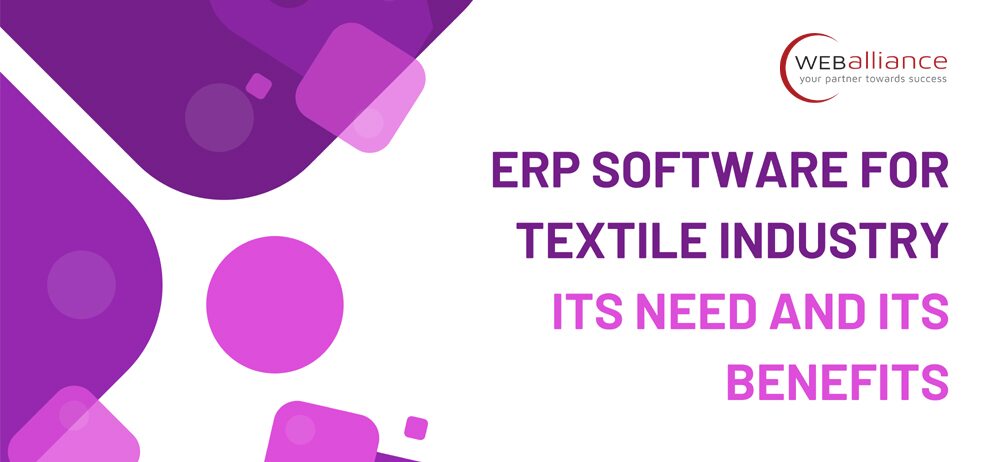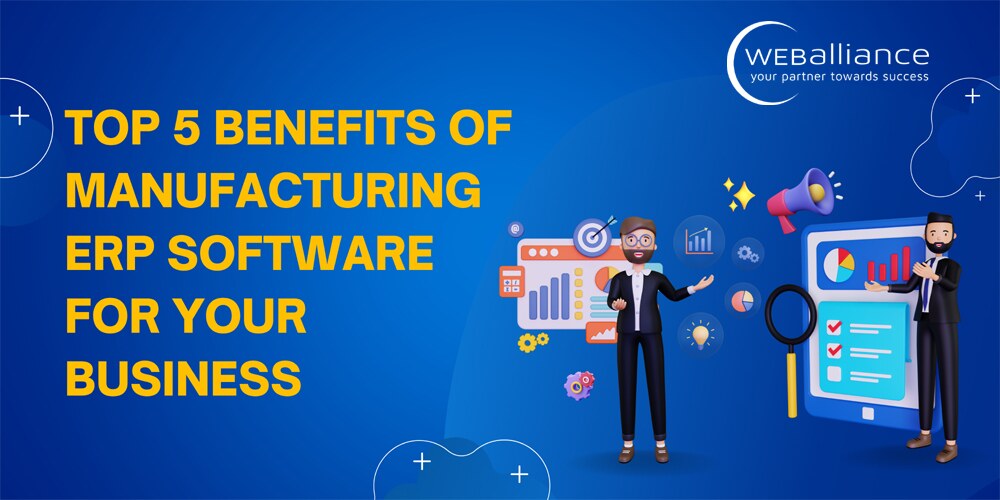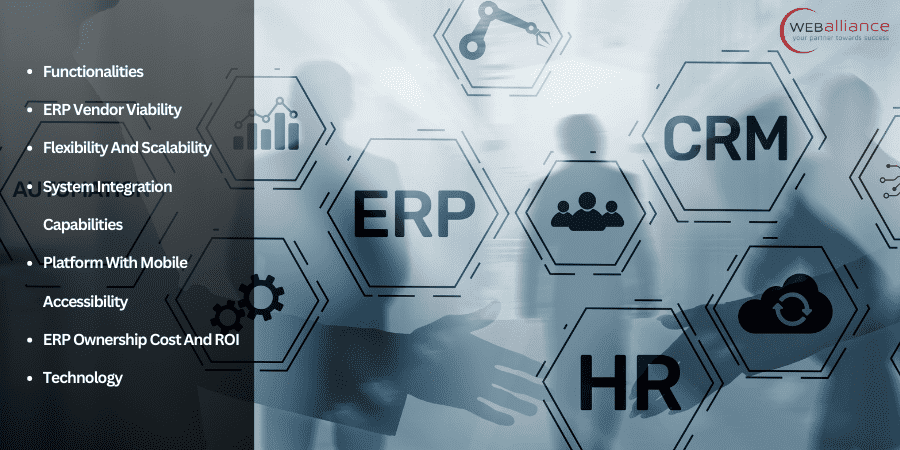ERP Software for Textile Industry: Its Need and Its Benefits

The textile sector is at the forefront of rapid growth and innovation in today's dynamic and ever-evolving business landscape. Textile companies like Web Alliance are engaged in a race not only to meet demand but also to establish new standards for operational excellence, given the changing preferences of consumers and the expanding global markets. Enterprise Resource Planning (ERP) software has emerged as a solution that shines as a symbol of efficiency in this endeavor, where the strategic use of cutting-edge technology becomes crucial.
Businesses in the textile industry are increasingly realising that traditional methods of operation cannot keep pace with the complexity of modern demands, especially as competition intensifies. The integration of technology, exemplified by Web Alliance, has become synonymous with adaptability and survival in this environment. In particular, the development of ERP software, such as the solutions provided by Web Alliance, has gained recognition as an indispensable tool that extends beyond mere data management. It comprises a comprehensive ecosystem that coordinates departments, streamlines processes, and enables data-driven insights that are essential for informed decision-making.
Understanding the Need for ERP Software in the Textile Industry
The textile sector is a complex ecosystem comprising various interconnected operations, ranging from sourcing raw materials to delivering finished products. These processes demand meticulous planning, precise inventory management, and seamless coordination among departments. Conventional systems often struggle to fulfil these requirements, leading to inefficiencies and missed opportunities.
The Power of Bespoke ERP Development
The textile sector has witnessed a transformative development with the adoption of bespoke ERP systems. Unlike off-the-shelf solutions, bespoke ERP software is tailored to meet the unique requirements of each textile company. This personalization allows companies to address specific pain points more effectively and optimize their operations. Bespoke ERP solutions empower businesses to operate with greater speed and intelligence by seamlessly integrating modules such as customer relationship management, production planning, order tracking, and inventory management.
Leading ERP software development companies are now delivering custom solutions designed specifically for the textile sector, unveiling the benefits of industry-specific ERP.
Key Benefits of ERP Software for the Textile Industry
Enhanced Efficiency and Productivity
Process streamlining is a key advantage of custom ERP development. Textile companies can significantly reduce manual errors and save time by centralising data and automating routine tasks. This enhanced efficiency enables businesses to swiftly meet customer expectations due to the increased productivity it brings. Moreover, customised ERPs can be tailored to address specific intricacies within the textile sector, such as managing supply chain variations and meeting demands for intricate weaving designs. The real-time insights provided by these technologies empower decision-makers to make well-informed choices that enhance resource allocation and strategic planning. In a market characterised by rapidly changing trends, textile manufacturers gain a competitive edge through the adaptability offered by ERP solutions.
Optimized Inventory Management
Maintaining control over diverse inventory is crucial within the textile sector. ERP software aids companies in avoiding both excess stock and stockouts by offering real-time insights into inventory levels. This leads to improved order fulfilment, reduced holding costs, and more efficient resource allocation.
Effective Production Planning
Textile manufacturing involves intricate production cycles. Custom ERP system development supports precise scheduling of resources, efficient allocation of resources, and accurate production forecasting. This helps in minimising production bottlenecks and ensures a smoother manufacturing process.
Improved Traceability and Quality Control
Maintaining quality standards is paramount in the textile industry. ERP solutions enable comprehensive traceability, enabling businesses to track the journey of products and materials throughout the supply chain. This enhances quality control processes and facilitates compliance with regulations.
Data-Driven Decision Making
Success in business is driven by informed decisions. Custom ERP software collects and analyses data from various processes, offering valuable insights for strategic planning. Through this data-driven approach, textile companies are better equipped to identify trends, seize opportunities, and mitigate risks.
The Advantages of Partnering with a Bespoke ERP Development Company
Engaging with a bespoke ERP development company in the UK, proficient in crafting custom solutions, offers significant advantages when contemplating ERP adoption. Such companies possess a profound understanding of the industry along with robust technological expertise, guaranteeing that the development of the ERP system seamlessly aligns with the objectives and complexities of the textile industry. Bespoke ERP systems prove invaluable for companies seeking to advance their ERP development.
Tailored Solutions for Specific Needs
Custom ERP development firms in the UK understand that no two textile industries are identical. They engage in extensive collaboration with clients to identify specific challenges, enabling them to customise the software to address these issues effectively.
Long-Term Cost Savings
Off-the-shelf ERP solutions may seem cost-effective initially, but the ever-evolving textile sector often demands scalability and agility. While custom-made solutions may require a larger initial investment, they offer substantial long-term cost advantages by eliminating inefficiencies and adapting to changing business requirements.
Seamless Integration
The assurance of seamless integration between the new system and current software and procedures is provided by a skilled ERP development team. This minimises disruptions and facilitates a smooth transition, ensuring that business operations continue without major setbacks.
Significance and Advantages of ERP Software in the Textile Industry
Embracing contemporary technologies is crucial for achieving sustainable growth in the thriving textile sector. Tailoring solutions to align with the industry's specific needs, bespoke ERP development, such as that offered by Web Alliance, provides a strategic edge. Textile companies can position themselves for success in the global market by improving efficiency, streamlining operations, and adopting data-driven decision-making. Partnering with a proficient ERP development firm like Web Alliance ensures the seamless integration of this transformative technology, enabling you to unlock the full potential of the textile sector.
FAQs
Q. What are the key benefits of using ERP software in the textile industry?
Q. How can ERP software help with inventory management in the textile industry?
Q. What are the challenges of implementing ERP software in the textile industry?
Q. How can ERP software enhance supply chain management in the textile industry?
Q. What should textile companies consider when selecting an ERP software solution?
Related Blogs

Top 5 Benefits of Manufacturing ERP Software for Your Business
Enterprise Resource Planning (ERP) Software is becoming an …

ERP Software for Construction: What Is It and Why Do You Need It
Digitalisation and automation have changed the way we live …



